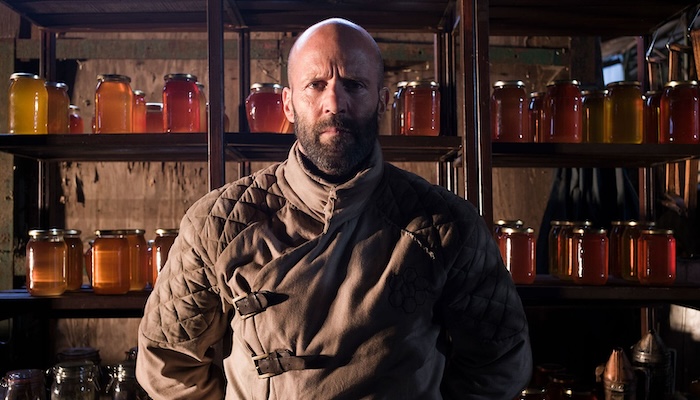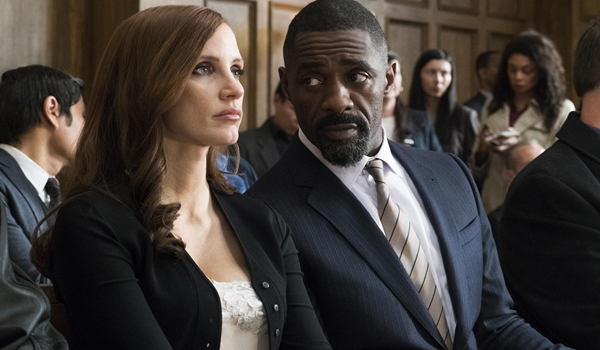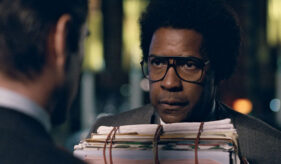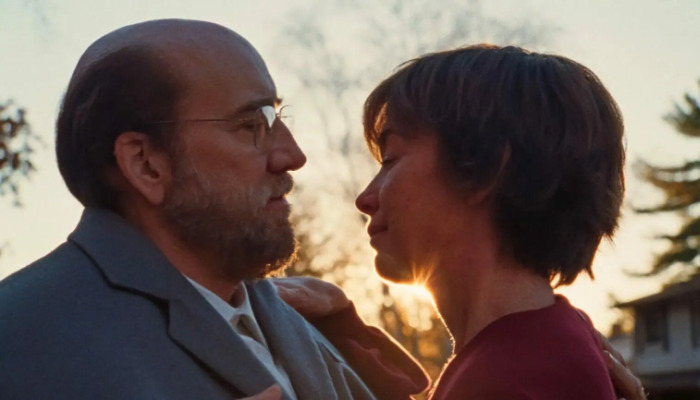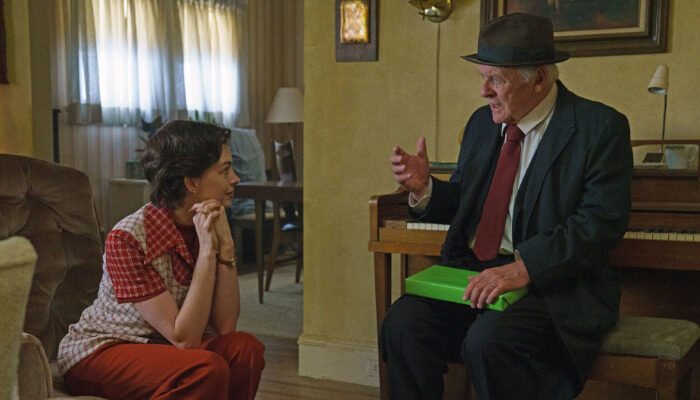Film Review: MOLLY’S GAME (2017): Aaron Sorkin Stacks the Deck in Our Favor
Molly’s Game Review
Molly’s Game (2017) Film Review, a movie written & directed by Aaron Sorkin, and starring Jessica Chastain, Idris Elba, Kevin Costner, Michael Cera, Chris O’Dowd, and Graham Greene.
Pretty much any story could be broken down to a simplistic pitch (revenge quest, self-discovery quest, boy-meets-girl, etc.), and Molly’s Game would be no different. It was fundamentally about the titular Molly Bloom (Jessica Chastain) leveraging her personal drive from a history with her father, Larry Bloom (Kevin Costner); through a meteoric rise, among hidden giants; to managing a calamitous fall, with Charlie Jaffey (Idris Elba) – a justice warrior disguised as an attorney – at her side. Pretty straightforward; but the Devil is always in the details, and detail is what writer/ Director Aaron Sorkin does best.
Molly’s Game applied that core dynamic to the then secret world of elite, high-stakes poker, along with the psychology & legalities involved, and the details pile up high & fast.
If the thought of applying card game stats, logic, and psychology to the overall theme of the film seems daunting to you, I suppose Molly’s story could be summed up with one phrase: For Want of a Nail. The Butterfly Affect of that passage was effectively established by the introductory scene, (I think) just to give layman viewers a perspective other than card player, from which to regard the unfolding story.
Sorkin has often been described as (if not accused of) being the smartest guy in the room; depicting some of the smartest characters anywhere in their natural habitat. more often than not, that means getting themselves into more trouble than mere mortals would think to ever find themselves, and dealing with it as only they can. We’ve seen this before – The Social Network being the most likely ready example – but there seemed to be something extra to the smarts, this time.
Personally, I wasn’t satisfied with the breakdown of his Zuckerburg presentation (the smart-ass snot, who just wanted to be accepted, was still just a snot). For Molly’s Game, however, the characters were more grounded, and brought more to the table.
This was just as well, as there were a lot of characters to keep track of. In keeping with the overall theme, I suppose the extended cast could be compared to a deck of cards – doled out into both winning & losing hands – with Sorkin being kind enough to allow us to keep track of which cards added up to which outcome. I guess this also spared us the trouble of having to remember why all these characters even existed, along with the wall chart narrative provided, via Molly’s God’s Eye narration of events.
Oh, and in the event the appearance of Michael Cera makes you recoil, at all: don’t worry, this film should count towards his ongoing effort to darken his image. To his credit, he provides his detractors with a more legitimate reason to hate him, than lovable-loser-next-door type casting fatigue.
I could argue that the Charlie Jaffey character’s principle role was drawing out details about Molly’s character – from Molly, herself – that would help establish her protagonist creds, without her having to toot her own horn (more endearing than having the smartest kid in the room tell you how great he/ she is). While those exchanges made for some of the best dialogue duets/ duels of the film, they also highlighted one particular plot point – one that came in handy, when certain aspects of the film gave me slight pause. More on that later.
To a certain degree, Charlie also served as a surrogate to the Larry Bloom character – with immediate parallels drawn between his interactions with his own daughter, and Molly’s familial history. I would cite this as an example of the story being spoon-fed to us, in places; but given the larger subject matter (and Sorkin’s penchant for insider shop-talk), this should be expected. Spoon-feeding doesn’t amount to condescension, in this case.
Given the scale of both Molly’s burden & sacrifice, she could have been easily depicted as a saintly figure – maybe with some superficial flaws thrown in, to pass for character depth – but the combination of intelligent script, and earnest acting/ directing, made for a more relatable protoganist. Throw in a consistent sense of humor, and you get a film that belies all of its projected high-stakes by not taking itself too seriously.
There was a moment of brutally frank violence, however, that made the game very serious – almost as a direct reminder of how high those afore mentioned stakes really went. It amounted to a fairly sharp turn, and was a bit hard to watch; but considering the level of fun generated, by plot & character craft up to that point (and beyond), that reminder may have been too necessary to be gratuitous.
Enough detail was provided to show that Molly was much more invested in people, than her younger self had let on, at one point; and the converging parallels, of real-time & flashback events, gives the film some impactful moments. Costner made the most of his limited screen time; taking his plot-driver role to a point of convincing catharsis, where the parallels met. With the likes of Costner, Elba, and Chastain, Sorkin managed to clear a lot off the table, before the final hand was dealt, without it feeling like a slight-of-hand exercise.
My only pause, regarding Molly’s Game, was just a nagging notion. Between its resolution, and the tent-pole role of a Psychologist father – helping to feed us the Why of Molly – it’s as if the film was daring us to challenge its more convenient elements; but then I think: “based on actual events” – so maybe ‘you can’t make this stuff up’ is the thing to be applied, here. Then I think back to Molly’s introductory monologue – the part were she mentions that certain details to the story were changed, to protect those involved.
The nagging notion then became a matter of how much of this film was ‘stranger than fiction,’ versus just fiction.
The notion did allow for a sly parallel, however, between the plot points to film Molly’s protective concerns over her book, and IRL Molly’s possible protective concerns with this film. I’d be be more than good with that, were it the case (and it could be).
The film also kept its focus where it belonged. There was a less than complete accounting of how all the various players & passersby turned out; but we were only left with what Molly was made privy to – such is life. I’d consider that a positive, since the lack of a typically Hollywood ending takes away from the notion that this was a Hollywood polish job.
Overall, I was left with the impression that I was granted a seat at a VIP table – an outsider allowed to watch the insiders at their best & worst. Aaron Sorkin does have a knack for that (considering his directorial debut worthy of his own writing skills should be the oddest thing I say about the man, at the moment), but the cast really sold the idea of extraordinary people still being people. People you might want to share a table with – for better or worse.
Much like some of its card players, Molly’s Game may leave you more satisfied with the experience, than the outcome. I’d consider myself a winner, in that regard; but I recommend you go for the pleasure of just watching the game play out.
Rating: 8/10
Leave your thoughts on this Molly’s Game review below, in the comments section. For more film reviews, visit our Movie Review Page, our Movie Review Facebook Page, and our Movie Review Google+ Page. Want up-to-the-minute notifications? FilmBook staff members publish articles by Email, Twitter, Tumblr, Google+, and Facebook.
Related Articles
FilmBook's Newsletter
Subscribe to FilmBook’s Daily Newsletter for the latest news!






